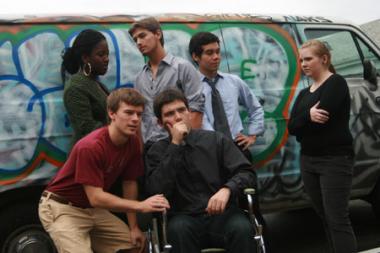A funereal air hangs over the opening scenes of two plays being performed on area campuses this weekend. Thing is, the one that takes place in an actual funeral parlor is a caustic comedy. The other one, set in a home that might as well be a cloister, begins in the somber aftermath of a funeral and ends with a death.
The title character in the comedy, Our Lady of 121st Street is—sorry, was—Sister Rose, a parochial school teacher in East Harlem who devoted her vocation to her unruly charges and her downtime to the bottle. When she dies from a fall into the gutter, a dozen of her former students gather for the wake, only to discover that the body has been stolen.
Rose would not have felt at home in The House of Bernarda Alba, the bleak Andalusian household in Federico Garcia Lorca’s drama playing this week and next at UMass. That play’s title character is an austere matriarch who exercises tyrannical control over her five grown daughters. Lorca wrote it in 1936, shortly before his execution by a fascist death squad at the outbreak of the Spanish Civil War.
The central theme, of autonomy and imagination imprisoned by an iron fist, is often seen as a grim commentary on totalitarianism. It’s no didactic allegory, however, but a pretty steamy drama of caged spirits and pent-up desire. Jealousy simmers among the five daughters, then boils over when the eldest gets engaged to the village’s sexiest young bachelor—who happens to be conducting an illicit affair with the youngest.
What director Toby Bercovici calls “a terribly messy, complex, brilliant play” has an all-female, mostly student cast, with a guest professional, Jeannine Haas, in the title role. We never see the alluring male lover—Bernarda’s house is a women-only asylum—but his tantalizing presence just beyond the courtyard walls permeates their barren world, and the UMass production’s in-the-round staging accentuates the claustrophobic atmosphere.
The air is just as thick in Our Lady of 121st Street, but here it’s dense with New Yorkese studded with casual obscenities. “What did Rose ever do but be a fuckin’ saint on this earth to deserve this?” says one of her now-grown-up students, referring simultaneously to her ignominious death and equally humiliating post-mortem disappearance.
The unscheduled reunion of the ’80s classmates rekindles old flames, revives old animosities, and both confirms and confounds previous assumptions. Rooftop, who’s become an LA radio DJ, still carries the torch for his ex-wife, Inez. Flip, a sleek black lawyer, brings along his flamboyant actor boyfriend, Gail. Quick-tempered Norca becomes the prime body-snatching suspect, not least because of her well-earned nickname, Nasty.
Director Estefania Colon, who played Norca in another production last year, says she wanted to stage Stephen Adly Guirgis’ 2003 play as her senior thesis project at Amherst College “because I was curious to see how this play would be received here. I do think it will provoke discussion,” she adds. Talkbacks are scheduled after the first two performances.
The House of Bernarda Alba: Oct. 28-30, Nov. 2-6, $8-16, Curtain Theater, UMass-Amherst. (413) 545-2511, www.umass.edu/fac.
Our Lady of 121st Street: Oct. 28-30, free, Holden Theater, Amherst College. Reservations at (413) 542-2277.



